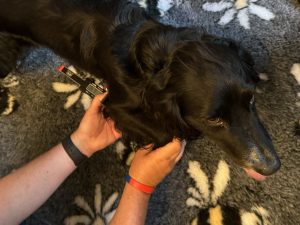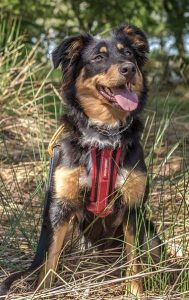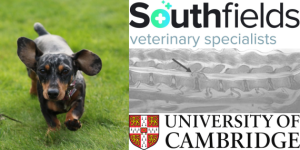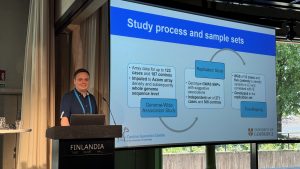 On Sunday 1st September, five runners teamed up on behalf of “Team CGC” to take part in London’s Big Relay – to raise money to support the Canine Genetics Centre and its idiopathic epilepsy (IE) research. It turns out that relays involve a lot more planning than the average race (which station is nearest to which start point? What time does each runner need to be in place? Who will look after whose kit bag…?), but the preparations paid off and after an early start all five runners were at their various start points, spread out from Tower Bridge to Canary Wharf, in plenty of time and raring to go. Continue reading
On Sunday 1st September, five runners teamed up on behalf of “Team CGC” to take part in London’s Big Relay – to raise money to support the Canine Genetics Centre and its idiopathic epilepsy (IE) research. It turns out that relays involve a lot more planning than the average race (which station is nearest to which start point? What time does each runner need to be in place? Who will look after whose kit bag…?), but the preparations paid off and after an early start all five runners were at their various start points, spread out from Tower Bridge to Canary Wharf, in plenty of time and raring to go. Continue reading
Author: Canine Genetics Centre
Cocker Crazy at the KC International Agility Festival!
 Last weekend we attended one of the largest Dog Agility shows in the UK, the Kennel Club International Agility Festival (KCIAF), where we met up with over 100 Cocker Spaniels. We were collecting data for research into Intervertebral Disc Disease (IVDD) as part of Bruno’s PhD. Continue reading
Last weekend we attended one of the largest Dog Agility shows in the UK, the Kennel Club International Agility Festival (KCIAF), where we met up with over 100 Cocker Spaniels. We were collecting data for research into Intervertebral Disc Disease (IVDD) as part of Bruno’s PhD. Continue reading
Exciting New DNA Test for Retinopathy with Vitamin E Deficiency (RVED) in Cocker Spaniels
 The Canine Genetics Centre (CGC) is excited to announce the launch of a new DNA test through Canine Genetic Testing (CAGT) for Retinopathy with Vitamin E Deficiency (RVED) in Cocker Spaniels. Our discovery, made in collaboration with leading veterinary ophthalmologists, could have significant health implications for Cocker Spaniels, and not only those born in the future but potentially some that are alive today. Continue reading
The Canine Genetics Centre (CGC) is excited to announce the launch of a new DNA test through Canine Genetic Testing (CAGT) for Retinopathy with Vitamin E Deficiency (RVED) in Cocker Spaniels. Our discovery, made in collaboration with leading veterinary ophthalmologists, could have significant health implications for Cocker Spaniels, and not only those born in the future but potentially some that are alive today. Continue reading
Mutation responsible for progressive retinal atrophy in the English Shepherd published
 Back in March, CAGT launched a DNA test for progressive retinal atrophy (PRA) in the English Shepherd Dog breed (PRA6). Since then we have been working on a manuscript detailing our research and we are very pleased to announce that it was published last Sunday in Genes.
Back in March, CAGT launched a DNA test for progressive retinal atrophy (PRA) in the English Shepherd Dog breed (PRA6). Since then we have been working on a manuscript detailing our research and we are very pleased to announce that it was published last Sunday in Genes.
Stanbury K, Schofield EC, McLaughlin B, Forman OP, Mellersh CS. Exonic Short Interspersed Nuclear Element Insertion in FAM161A Is Associated with Autosomal Recessive Progressive Retinal Atrophy in the English Shepherd. Genes. 2024; 15(7):952. doi: 10.3390/genes15070952
Investigating the genetics of disc calcification in Dachshunds
 We have introduced Bruno Lopes to our supporters before – Bruno is a veterinary neurologist, from Southfields Veterinary Specialists, who has recently started studying for a PhD on a part-time basis at Cambridge Vet School. For his PhD, Bruno will be investigating the genetics of Intervertebral disc disease (IVDD), the most common cause of spinal injury in dogs. IVDD can affect all breeds but chondrodystrophic (short-legged) breeds are at highest risk and Dachshunds are more likely to be affected by IVDD than other breeds. Continue reading
We have introduced Bruno Lopes to our supporters before – Bruno is a veterinary neurologist, from Southfields Veterinary Specialists, who has recently started studying for a PhD on a part-time basis at Cambridge Vet School. For his PhD, Bruno will be investigating the genetics of Intervertebral disc disease (IVDD), the most common cause of spinal injury in dogs. IVDD can affect all breeds but chondrodystrophic (short-legged) breeds are at highest risk and Dachshunds are more likely to be affected by IVDD than other breeds. Continue reading
Meet the Beagles!
 Hundreds of Beagles and their owners came together on Sunday 7th July at scenic Sysonby Acres, just outside Melton Mowbray, to enjoy a day of Beagle-related events, activities and stalls. The occasion was Beagle Welfare’s 45th Anniversary Fun Day and CGC keenly accepted an invitation to attend. Continue reading
Hundreds of Beagles and their owners came together on Sunday 7th July at scenic Sysonby Acres, just outside Melton Mowbray, to enjoy a day of Beagle-related events, activities and stalls. The occasion was Beagle Welfare’s 45th Anniversary Fun Day and CGC keenly accepted an invitation to attend. Continue reading
8 runners, 4 legs, 2 teams and a Border Collie who started it all
 On 1st September, two teams will be heading to London to run the Big Relay and raise funds to support the Canine Genetics Centre and its idiopathic epilepsy (IE) research. One team, who came up with the idea, was inspired by a Border Collie named Buddy; the second team is made up of CGC researchers who are eager to support the cause. Continue reading
On 1st September, two teams will be heading to London to run the Big Relay and raise funds to support the Canine Genetics Centre and its idiopathic epilepsy (IE) research. One team, who came up with the idea, was inspired by a Border Collie named Buddy; the second team is made up of CGC researchers who are eager to support the cause. Continue reading
CGC Member represents the UK at Flyball World Cup

All of the CGC team are dog lovers and most have at least one pet dog. Our Bioinformatician, Ellen, is slightly different though as she has multiple dogs and competes in the sport of flyball outside of work. Ellen has recently competed at the Flyball Open World Cup in Germany where her team came 4th in the world! Continue reading
Five go to Finland Forum
 Last week five members of the Canine Genetics Centre (CGC) team visited Helsinki, Finland, to attend the 12th International Conference of Canine and Feline Genetics and Genomics (ICCFGG) – a trip made possible by a ring-fenced donation to the CGC. Continue reading
Last week five members of the Canine Genetics Centre (CGC) team visited Helsinki, Finland, to attend the 12th International Conference of Canine and Feline Genetics and Genomics (ICCFGG) – a trip made possible by a ring-fenced donation to the CGC. Continue reading
Epilepsy study sample collection off to a flying start
 Earlier this year the CGC announced the broadening of its idiopathic epilepsy (IE) project to include Beagles, English Springers, Giant Schnauzers, Hungarian Vizslas and Irish Setters. The IE team is pleased to report that the launch has met with a very enthusiastic response from dog owners: around 160 swab kits for the above five breeds have been sent out, with more kit requests coming in every day. Continue reading
Earlier this year the CGC announced the broadening of its idiopathic epilepsy (IE) project to include Beagles, English Springers, Giant Schnauzers, Hungarian Vizslas and Irish Setters. The IE team is pleased to report that the launch has met with a very enthusiastic response from dog owners: around 160 swab kits for the above five breeds have been sent out, with more kit requests coming in every day. Continue reading

